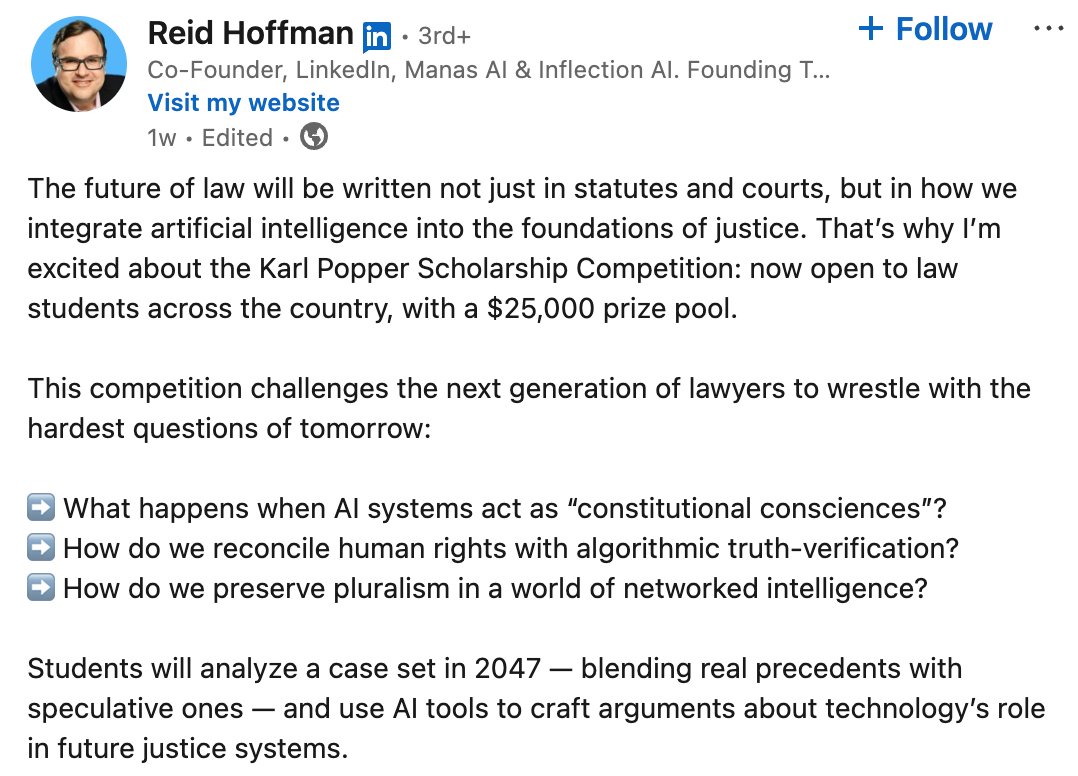Write A Filing For This Futuristic AI-Refugee Case Hypo And Win $10,000


In 2047, Ahmad Hakim and his family are climate refugees fleeing the Levantine Consolidation Zone after Ahmad refused to place his daughters in mandatory fertility conscription. The family seeks sanctuary in CoralNet, a community governed though “judicial meshes” combining human, AI, and nonhuman perspectives. It’s unlikely that we’re less than 25 years away from animals weighing in on judicial decisions, but I, for one, welcome our new Orca overlords — they seem to have the right idea. Authorities deny sanctuary to Ahmad himself, while provisionally granting sanctuary to his wife and children, on the grounds that Ahmad refuses to allow AI copilots for himself or his children, refuses verification literacy training, and rejects CoralNet’s epistemic infrastructure.
As a hypothetical, it goes a lot further out there than your 1L Torts final. This is the background for the Karl Popper Legal Reasoning Scholarship competition, challenging law students to navigate a future dominated by “artificial intelligence, climate change, and evolving concepts of personhood and humanism” as well as rising global authoritarianism. Law students are given a description of the case and a body of real and hypothetical precedent, and asked to enter a 2000-5000 word submission in the form of either a party brief, a judicial opinion, or a scholarly analysis.
And, in keeping with an AI-driven future, students are not only allowed, but encouraged to use AI in their submissions.
The competition has $25,000 prize pool and is open to JD/LLB, LLM, SJD, and PhD candidates, either working solo or in teams up to three. First prize earns $10,000, the two runners-up receive $2,500 each, and seven finalists will take home $500. The deadline is October 10, 2025, 23:59 UTC.
LinkedIn cofounder Reid Hoffman took to, well, LinkedIn to express his interest in the competition:

The future of law being written by “how we integrate artificial intelligence into the foundations of justice” sounds appropriately dystopian, but the present of law is written by a mix of Calvinball and “who paid for Clarence Thomas’s last vacation,” so maybe ChatGPT should take a stab at it.
There is an AI executive out there claiming his AI can replace human judges. He is also an idiot.
But even if artificial intelligence won’t take its place in the foundations of justice, it’s certainly going to reshape the legal workflow. Lawyers already use these word calculators the same way they historically used junior associates, to write first drafts that get marked up enough to make Theseus wince. Judges will also employ more AI in their process, even if they don’t want to, as legal research products integrate more and more AI on the backend.
AI hallucinations have embarrassed lawyers up and down the prestige scale. The best hope for the next generation of attorneys is to get them actively employing the technology early so they can figure out what it can and cannot actually do. Law schools will harbor understandable skittishness about turning students loose on AI-assisted projects, making competitions like this one all the more important.
Beyond the technology, the competition asks an interesting philosophical question, inspired by Karl Popper himself, about the limits of tolerance. Popper famously warned that tolerance requires a society to be intolerant of intolerance, a timely maxim to remember as some of the loudest demands for “free speech” come from those preaching intolerance. How does a society balance open discourse with a tolerating a media landscape built around hijacking it for fascist ends? The best answer historically is to let the audience speak freely themselves: to protest, to mock, and to boycott. Those rights of the audience have come under assault from those who want to say that free speech is the affirmative right to be protected from criticism. This interpretation, couched in the language of freedom, was always a precursor to fascism because its fundamental logic rests on coercive government action to silence opposition. So when we start seeing FCC licenses dangled to get late-night hosts removed for making jokes, it’s just one more step on the road to eroding the guardrails protecting society from intolerance.
But, Popper’s tolerance paradox goes deeper than speech, the hypothetical asks about granting asylum to a father who espouses racist and misogynist views that clash with the community while keeping a family fleeing persecution together. Should a society seek to keep out intolerance at the cost of punishing the whole family? When should the state sacrifice cultural pluralism to protect the individual rights of the family members? Then throw the concept of compelled AI copilots onto all this.
It’s a fascinating competition. Read more about it here. And remember, you have until October 10, 2025, 23:59 UTC to enter.
 Joe Patrice is a senior editor at Above the Law and co-host of Thinking Like A Lawyer. Feel free to email any tips, questions, or comments. Follow him on Twitter or Bluesky if you’re interested in law, politics, and a healthy dose of college sports news. Joe also serves as a Managing Director at RPN Executive Search.
Joe Patrice is a senior editor at Above the Law and co-host of Thinking Like A Lawyer. Feel free to email any tips, questions, or comments. Follow him on Twitter or Bluesky if you’re interested in law, politics, and a healthy dose of college sports news. Joe also serves as a Managing Director at RPN Executive Search.








